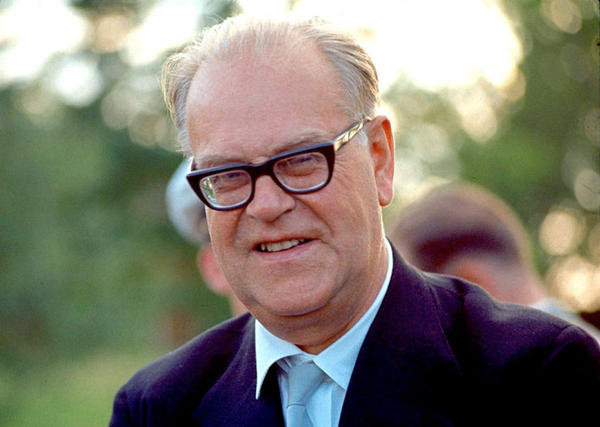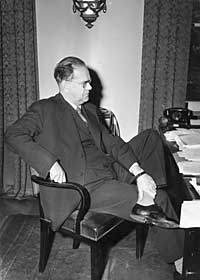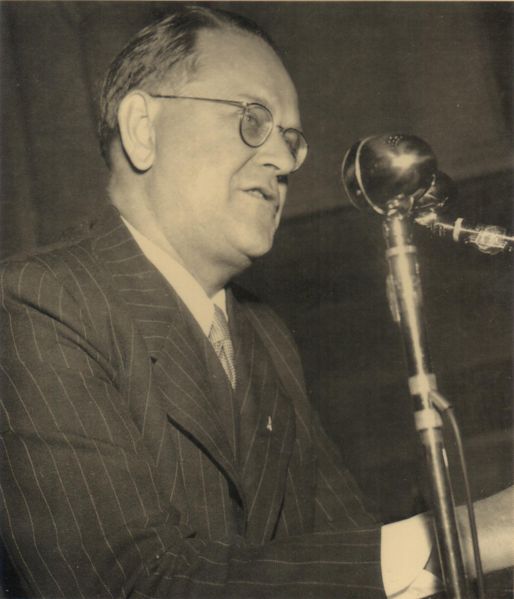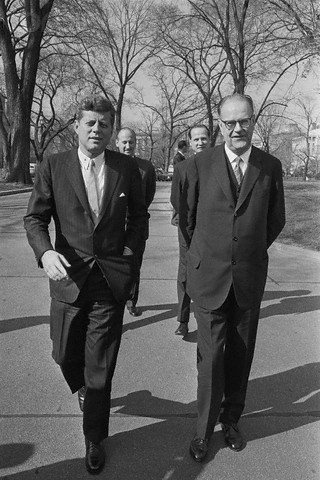<Back to Index>
- Physicist Thomas Young, 1773
- Photographer Jacques Henri Lartigue, 1894
- Prime Minister of Sweden Tage Fritiof Erlander, 1901
PAGE SPONSOR


Tage Fritiof Erlander (13 June 1901 – 21 June 1985) was a Swedish politician. He was the leader of the Swedish Social Democratic Party and Prime Minister of Sweden from 1946 to 1969.
Erlander holds the record as the longest serving head of government of any democratic country, as he held his post for 23 years.
He was born in Ransäter, Värmland County, as son of the school teacher Erik Gustaf Erlander (1859 - 1936). His mother was Alma Nilsson (1869 - 1961). As a student at Lund University he was heavily involved in student politics and met many radical students. He graduated in political science and economics in 1928. Erlander was a member of the editorial staff of the encyclopedia Svensk Upplagsbok from 1929 to 1938. In 1930 he married Aina Andersson, who became Aina Erlander.
Tage Erlander was elected to the municipal council in Lund in 1930, became a member of parliament in 1932, and was appointed a State Secretary at the Ministry of Social Affairs in 1938. As State Secretary at the Ministry of Social Affairs, Erlander was one of the most senior officials responsible for the establishment of internment camps in Sweden during World War II. In the camps, which were kept secret to the Swedish public, people from various ethnic minorities as well as political dissidents were interned.
In 1942, State Secretary Erlander together with then Minister for Social Affairs Gustav Möller initiated a nation-wide registration of the so called Travellers ethnic group, a branch of the Romani people that has been resident in Sweden for some 500 years. The purpose of the registration was, according to a newspaper article, to make the base for "radical measures" against this "bottom layer of the Swedish population". In Norway, similar lists were established that were handed over to the Nazis during the German occupation of Norway.
He became a member of the cabinet in 1944 as Minister without Portfolio, a post he held to the next year, when he became Minister for Education. When Prime Minister Per Albin Hansson suddenly died in 1946, Erlander was unexpectedly chosen as the successor and was also chosen as the leader of the party.
He formed a coalition with the Centre Party between 1951 and 1957. His working relationship with the party's leader, Gunnar Hedlund (who during the coalition served as Home Affairs Minister), is known to have been good.
Erlander coined the phrase "the strong society", describing a society with a growing public sector taking care of the growing demand on many services that an affluent society creates. The welfare state grew considerably during his years as prime minister, while nationalizations were rare.
He stepped down in 1969 and was succeeded by Olof Palme, who in many ways had been Erlander's student and protege. From 1972 to 1982 he published his memoirs in six volumes. He died on 21 June 1985 in Stockholm.
He was the father of the mathematician Sven Erlander, who since 2001 has published his father's diaries.

